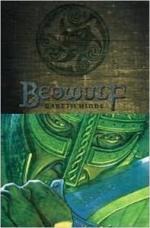|
This section contains 848 words (approx. 3 pages at 300 words per page) |

|
Evil Is Absolute in "Beowulf"
Summary: Evaluates the epic poem, Beowulf. Discusses the nature of evil as described in Beowulf. Considers the occurrences of absolute evil as opposed to relative evil.
The nature of evil is bought up over and over again in Beowulf. A denotative sense of the word can be described as morally reprehensible, sinful and wicked. However, the word has many connotations embedded in its use. There are different degrees and standards of evil. However, despite the many connotations, evil is absolute and should not depend on the circumstance as described in Beowulf. The characters, although they are not necessarily evil, they tend to act wickedly. Through an absolute view, evil becomes universal. Beowulf, which portrays evil's nature in the form of a monster, hero, and humanity, gives it an absolute standard and makes it universal throughout the humanity.
All of the characters' actions have evil rooted in them. Beginning with Grendel, he is described as ."..the monster relished its savage war on the Danes, keeping the bloody feud alive, seeking no piece, offering no truce...
|
This section contains 848 words (approx. 3 pages at 300 words per page) |

|


